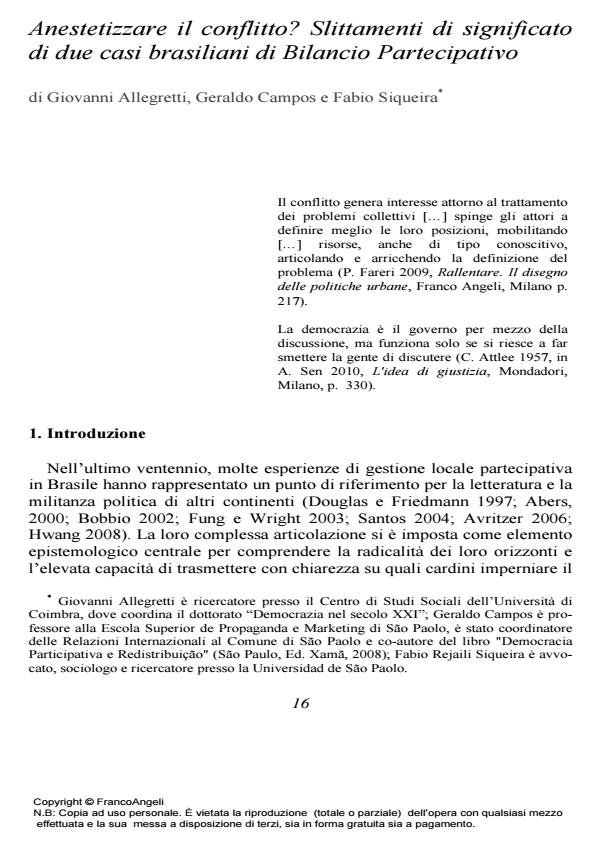Anestetizzare il conflitto? Slittamenti di significato di due casi brasiliani di Bilancio Partecipativo
Titolo Rivista PARTECIPAZIONE E CONFLITTO
Autori/Curatori Giovanni Allegretti, Geraldo Campos, Fabio Siqueira
Anno di pubblicazione 2011 Fascicolo 2010/3
Lingua Italiano Numero pagine 24 P. 16-39 Dimensione file 536 KB
DOI 10.3280/PACO2010-003002
Il DOI è il codice a barre della proprietà intellettuale: per saperne di più
clicca qui
Qui sotto puoi vedere in anteprima la prima pagina di questo articolo.
Se questo articolo ti interessa, lo puoi acquistare (e scaricare in formato pdf) seguendo le facili indicazioni per acquistare il download credit. Acquista Download Credits per scaricare questo Articolo in formato PDF

FrancoAngeli è membro della Publishers International Linking Association, Inc (PILA)associazione indipendente e non profit per facilitare (attraverso i servizi tecnologici implementati da CrossRef.org) l’accesso degli studiosi ai contenuti digitali nelle pubblicazioni professionali e scientifiche
The article aims to analyze the transformations of two Brazilian experiences of Participatory Budgeting (PB) following a political change of the governing majority in 2005. The main focus relates to the shrinking of the "potential for conflict" which is usually considered a pivotal element in the success of such a participatory tool. The essay is based on two well-known case studies - those of the metropolises of São Paulo and Porto Alegre - whose last political period has not been the object of many studies, unlike previous phases during which their Participatory Budgeting practices became a worldwide references. The article highlights the ways such institutional transformations (which modified PB in Porto Alegre, while suspending and substituting it in São Paulo) have been associated with the emergence of a new discourse on participation, more focused on a "partnership-driven" perspective. The results underline that the shrinking of "conflictive spaces" provided by the new participatory arenas is part of a wider significant shift in the relationship established with stakeholders and citizens at large. The shift involves the institutional design of the participatory processes as well as the degree of empowerment fostered by the two experiences.
Parole chiave:Conflict, Participation, Participatory Budgeting, Governance, Social Partnership
- Taxation of Digital Companies: Experience of Russia and Other Countries Dmitriy Kopin, Anna Kopina, Ulrica Muffatto, in Financial Law Review /2021 pp.1
DOI: 10.4467/22996834FLR.21.017.14437 - Réformer par l'expérimentation : la réception du budget participatif des lycées en Région Nord-Pas-de-Calais Julien O’Miel, Aymeric Mongy, in Participations /2014 pp.207
DOI: 10.3917/parti.009.0207 - Understanding Politics and Society Fabio de Nardis, pp.253 (ISBN:978-3-030-37759-5)
- Identifying Models of National Urban Agendas Giovanni Allegretti, Gianluca Sgueo, pp.357 (ISBN:978-3-031-08387-7)
Giovanni Allegretti, Geraldo Campos, Fabio Siqueira, Anestetizzare il conflitto? Slittamenti di significato di due casi brasiliani di Bilancio Partecipativo in "PARTECIPAZIONE E CONFLITTO" 3/2010, pp 16-39, DOI: 10.3280/PACO2010-003002